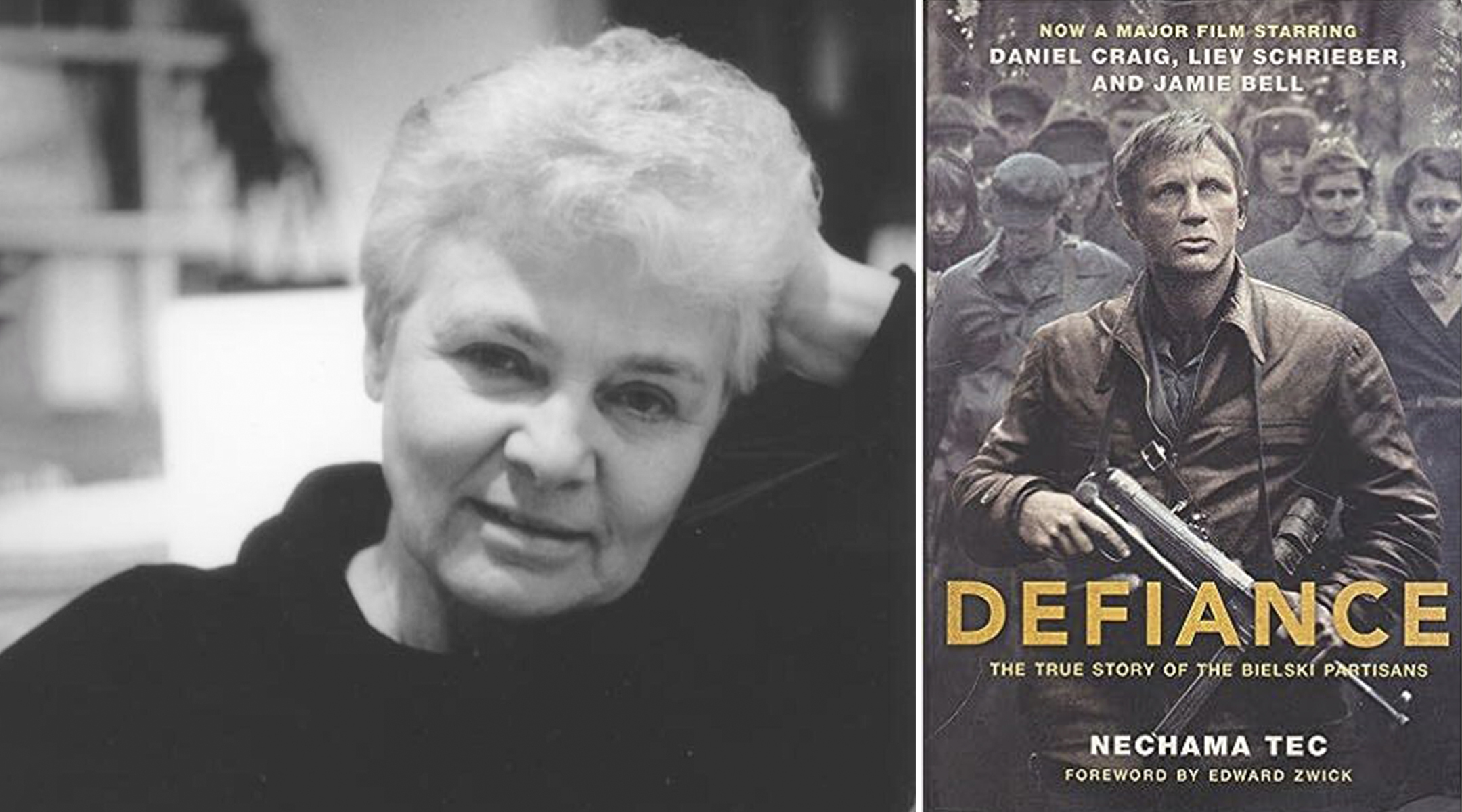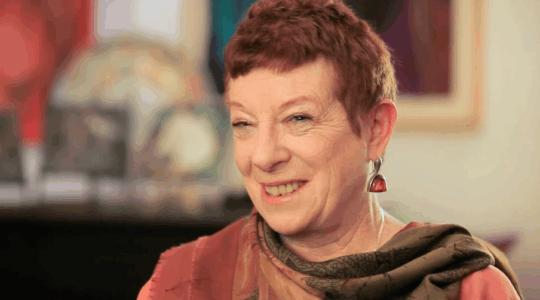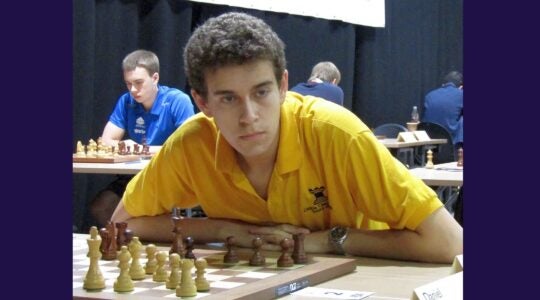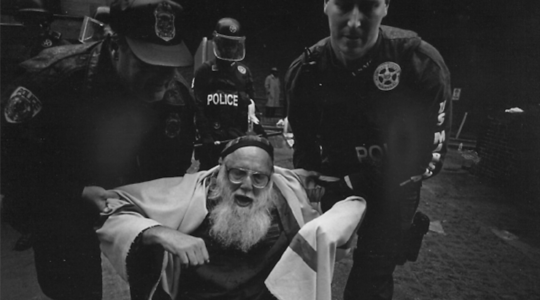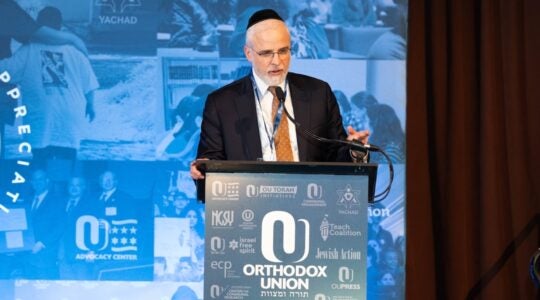(JTA) — Nechama Tec, a Holocaust survivor and historian whose book about a group of Jews in Belarus who successfully defied the Nazis was made into the 2008 film “Defiance,” died Aug. 3 in New York City, following an illness. She was 92.
Tec, a member of one of only three Jewish families from Lublin, Poland, to survive the Holocaust intact from a prewar population of some 40,000, was for decades on the sociology faculty at the University of Connecticut in Stamford. Her books included “Resilience and Courage: Women, Men, and the Holocaust” (2003) and “When Light Pierced the Darkness: Christian Rescue of Jews in Nazi-Occupied Poland” (1986).
Prior to the film adaptation of her 1993 book, “Defiance: The Bielski Partisans,” Tec was best known within the academic world and the tight-knit community of American Holocaust survivors.
The film version of “Defiance” was directed by Edward Zwick and starred Daniel Craig and Liev Schreiber as the Bielski brothers, Tuvia and Zus. Under the brothers’ leadership, Jewish partisans rescued Jews from extermination and fought the German occupiers and their collaborators in what is now western Belarus.
Historians had long known of uprisings at the Auschwitz and Treblinka camps, in addition to the better-known rebellion in the Warsaw Ghetto led by Mordecai Anielewicz, but the story of the Bielskis differed fundamentally in that it was successful.
When Tec set out to write a book about the Bielski brothers, she sought to fill in omissions and correct distortions created by their almost-total excision from historical accounts of the Holocaust.
“The omission is the conspicuous silence about Jews who, while themselves threatened by death, were saving others,” Tec wrote in the opening to “Defiance.” “The distortion is the common description of European Jews as victims who went passively to their death.”

Daniel Craig played one of the leaders of a successful Jewish uprising during World War II in the 2008 film “Defiance.” (Screen shot from YouTube)
In her five-decade career at the University of Connecticut, Tec explored overlooked or under-reported aspects of resistance during the Holocaust, including the role of Christian rescuers and the gender dynamics among and between Jewish survivors.
She received numerous awards for her publications, including a Pulitzer Prize nomination for “Resilience and Courage.” She was awarded the 1994 International Anne Frank Special Recognition prize for ”Defiance.” She was a member of the advisory council of the YIVO Institute for Jewish Research in New York. In 2002, she was appointed by President George W. Bush to the council of the United States Holocaust Memorial Museum in Washington, D.C.
Born May 15, 1931, to Roman Bawnik and Esther (Hachamoff) Bawnik, Tec was 8 years old when the Germans arrived in Lublin. She and her sister survived three years by posing as the nieces of a Catholic family; her parents also survived the war by hiding in homes and evading German detection.
“An extra layer of secretiveness, combined with a fear of discovery, became part of my being,” she wrote of those years in her 1982 memoir, “Dry Tears: The Story of a Lost Childhood.” “All my life revolved around hiding; hiding thoughts, hiding feelings, hiding my activities, hiding information.”
After the war, Tec immigrated to Israel, where she married Leon Tec, a noted child psychiatrist. Later they moved to the United States, where she earned her bachelor’s, master’s and doctoral degrees at Columbia University and served on the faculty there for a decade. She began teaching at Connecticut in 1974.
The couple had two children, one of whom — son Roland — co-produced the “Defiance” film. Her daughter, Leora Tec, is the founder and director of Bridge To Poland, an organization that aims to improve relations between Jews and non-Jewish Poles. Her husband died in 2013; both children survive her.
Tec met Tuvia Bielski only once, in Brooklyn, New York, just weeks before his death in 1987. In a 2009 interview with JTA, she recalled that Bielski’s legendary charisma was apparent, even though he was old and frail.
“He was whispering,” she recalled. “I thought that my tape recorder won’t get anything. And I was trying to have the information flow. And as he got into his past, he sort of just, before my eyes, he became the person that he was, this charismatic leader, that has this absolute power in the unit.”
She added, “When he came into the room, he filled it with himself.”
While Tec was gratified that the film offered a counterpoint to allegations of Jewish passivity during the Holocaust, she also resisted what she called an impulse to blame the victim.
“Antisemitism is with us; it is like a perpetual, chronic addiction of humanity,” she told JTA. “You cannot learn about antisemitism by examining what the antisemites tell us because this is not based on fact. It is based on their need to blame somebody for something that they have not done.”
A memorial service for Tec at Manhattan’s Plaza Memorial Chapel is planned for Oct. 1.
JTA has documented Jewish history in real-time for over a century. Keep our journalism strong by joining us in supporting independent, award-winning reporting.
